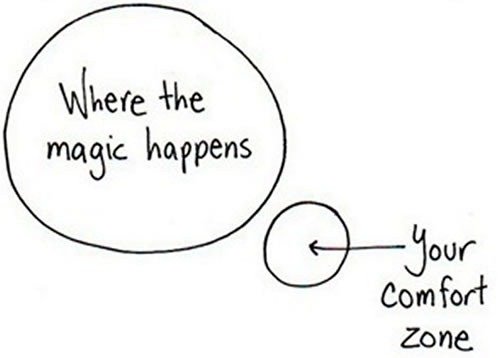In defense of comfort zones + updating your own OS
A few days ago I read and enjoyed “Re-Entering the Matrix” by @maceytomlin
I got quite perplexed reading a line, though.
“One of the biggest problems we have as human beings is that we learn how to create mental habits. Once we create a comfort zone, we rarely step out of it.”
I understand what this means and I agree that, by rarely stepping out our comfort zone, we miss most of the magic adventures life can offer us.

At the same time, I don’t think that learning how to create mental habits is one of the biggest problem we face as human beings.
I actually like some habits pretty much. I love to open the window to breath fresh air as soon as I wake up. I like to walk then to the bakery to buy the fresh bread and nibble a small piece of it while walking back. I love to do some mental and physical exercises that connect me stronger to the “right here, right now” moment and focus and what I want to accomplish that day. That’s basically how my days start and I love this routine. Though I am not a slave of it, those are my daily habits and this is my comfort zone: I love them and I worked hard for them – moving to live in the countryside, have an home-based job, develop my inner peace.
I wouldn’t say, therefore, that there is a problem with comfort zones at all; for me those are the bases where we rest from our daily explorations. The problem is to create them deliberately: knowing your habits and knowing how and when to change them.
I like a computer metaphor for that. Think at yourself as The Programmer. You program a software that give an output to a set of inputs. In our childhood that’s pretty simple:
if feel sense of hunger [look for a breast]
if see no breast [cry until get attention] and so on
Children run similar software for quite a while. When they need something they start crying. Later, other needs appear, such as being recognized as an older person: crying gets substituted by explaining their needs. Still, is not unusual to see traces of those childish software run even later. It’s not unusual to see adults who generate a sense of sadness or victimhood when they don’t get the attention they want. Unfortunately, a software that was useful in childhood may not be useful in adulthood: appearing cute may be functional to receive approbation and smiles from your mother, but dysfunctional if you are now working as a top-executive.
In conclusion, learning mental habits, creating routines and comfort zones are all great tools we, as human beings, have that help us to accomplish long-run missions. There would be no olympics athletes without physical and mental habits. The problem is that we, as human beings, lost the manual that explain how to update those software and our operating system: you can find people who want to stop a routine (eating to much, addictions) but never succeed. I encountered many different techniques in the last years (meditation techniques, journaling, self-awareness practices) that helped updating my operating system freeing a lot of computing power and memory to focus on what I what to accomplish now. I’m curious if you, dear reader, have gone through something similar.